CHANGE YOUR STORY
At the heart of our campaign are our learning ambassadors – take a look below at their inspirational stories.
They have all taken the first step to turn their lives around to build a better future for themselves, their family and their community. Adult learning has been key to each of their success stories and for many a lifeline. Become inspired by clicking on any of the images below to read or watch their story. This is what adult learning can do for you, you can change your story too.

Walid Musa Albuqai
Walid Musa Albuqai grew up in Syria but was forced to flee the country with his wife and three daughters ten years ago because of…
Read Walid's Story
Walid Musa Albuqai
Walid Musa Albuqai grew up in Syria but was forced to flee the country with his wife and three daughters ten years ago because of the war. He’d worked on a farm during his early years and later as a warehouse manager and factory worker but struggled to find a permanent role due to the ongoing conflict.
Walid said: “Because of the situation in Jordan, Lebanon and Syria, the United Nations gave families like mine the option to move to the UK. Not everyone moved, but my family and I decided it was the right thing to do. We were told we’d be moving to Swansea, and I was excited because I had never been to Wales before. I love it here because of the people and the beautiful beaches. It’s a very friendly city and I’ve been able to find work which I’m very grateful for.”
When he first arrived in Swansea, Walid spoke very little English. He struggled with basic grammar and sentence structure, so he started studying Entry Level 1 English as a Second Language (ESOL) at Gower College Swansea.
“When I first moved to the UK my English was very basic. My support workers helped a lot, and I volunteered at a charity shop to practice my English and start making friends with people in the local community” he said.
By attending classes regularly, studying outside of class and taking opportunities to practice speaking English, Walid was able to develop his language skills. He also took advantage of online resources including grammar lessons and apps to continue learning outside of his classes.
“My daughters are thirteen, nine and six. They go to English-language schools and have also helped me to improve my English. They, along with my wife, inspire me every day and have encouraged me to turn my dreams into a reality.”
Walid has now completed ESOL Levels 1 and 2 and he applied for a number of jobs including a bus driver role with FirstBus. His passion for driving and language skills shone through during the interview, and he got the job.
“I absolutely love working as a bus driver. Practically, the exam wasn’t too difficult, but the theory test was hard. I wouldn’t have been able to do the interview without my English skills. I owe my career to those classes.”
Walid is now looking ahead to the future and hoping to complete ESOL Level 3 before re-training as a driving instructor. He says, “I would like to encourage others to return to learning and pursue their goals, no matter how challenging it may seem. My advice is to work hard and never give up. Nothing is impossible if you put your mind to it. I am excited to see where my journey takes me as I continue to make my way towards my goals and making a difference in my community.”
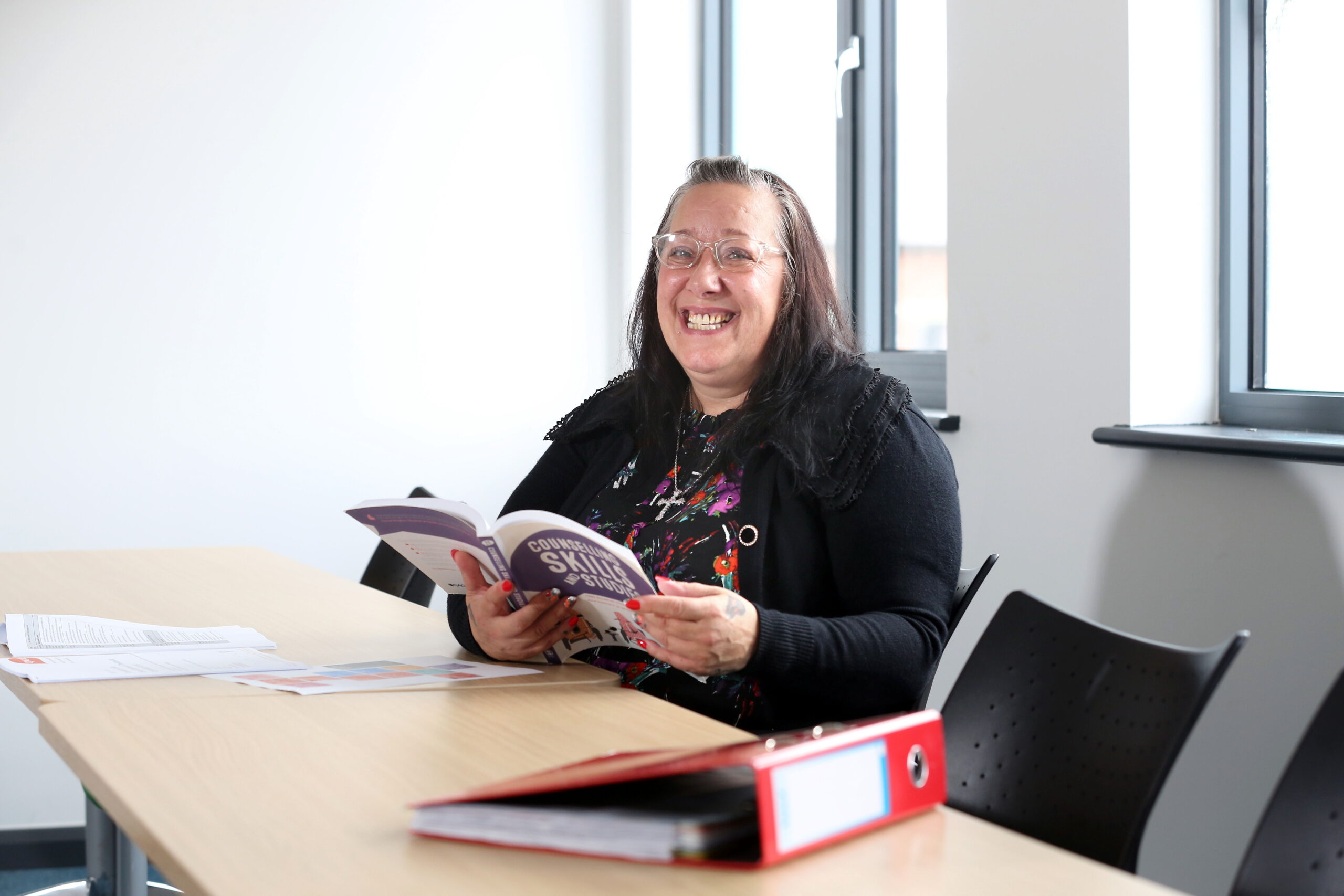
Rachel Parker
Rachel Parker was born into a chaotic home life with alcoholic parents and little support at the time for her development and schooling. After being…
Read Rachel's Story
Rachel Parker
Rachel Parker was born into a chaotic home life with alcoholic parents and little support at the time for her development and schooling. After being taken into care, she left school at a young age and found her escape in drugs and alcohol. After years of addiction, Rachel is now clean, and on her way to achieving her dream of becoming a counsellor.
She explains: “Drugs and alcohol took me out of my reality, but it was stunting my growth and limiting my potential.” Rachel became a young mother at 18 after giving birth to her daughter Holly who was born blind and had other severe disabilities. It was difficult for her to provide the level of care Holly needed while she was in active addiction. After losing custody of Holly, Rachel’s life spiralled, with her addiction taking over.
Despite her addiction, Rachel had dreams of a career where she could help others. She looked up to her substance misuse counsellors: “Throughout my treatment I would often think to myself, if I could stay clean, perhaps I could do their job one day.”
Rachel noticed that people found her approachable and would regularly go to her with their problems, which she always made time to listen to. “Sadly, I was in no position to train to become a counsellor while living in active addiction.” She explained.
Years later, once Rachel was able to get herself clean and remain sober, she was able to start thinking about training and turning her life around. She remembers: “It wasn’t until I began to realise that my lifestyle was killing me, that I begged my counsellor for help to get me into rehabilitation. Thankfully, she secured the funding, and I believe she saved my life.”
In 2017, she began training with Addysg Oedolion Cymru | Adult Learning Wales., Nicola Holmes, nominated Rachel for the award said: “Rachel’s story is one of determination, dedication, and personal growth. She’s had many setbacks during her journey, and at times had days when she doubted herself. Yet I have never met someone so determined to make a change, not only for their own future but for all those who need support just like she did all those years ago.”
Now, nine years sober, Rachel has been a qualified counsellor for a year, having completed over 100 hours of counselling to pass her diploma. “Qualifying felt surreal, I was ecstatic and so proud of myself.” says Rachel.
She works regularly at the Narcotics Anonymous helpline, saying “I want to counsel people because I want to give back, I don’t want to be a nuisance to society.”
Rachel’s faith has kept her strong throughout the many losses she’s endured, including the death of her daughter Holly two years after she became sober.
She has progressed through her Level 2 and 3 diplomas, studying for a Level 4 diploma has been placed on hold while she takes time to deal with her health conditions. She remains a strong advocate for adult learning, saying, “You’ve got to go for it and give yourself that opportunity. You’re going to meet new people, make new friends, and learn a lot about yourself and the world around you.”
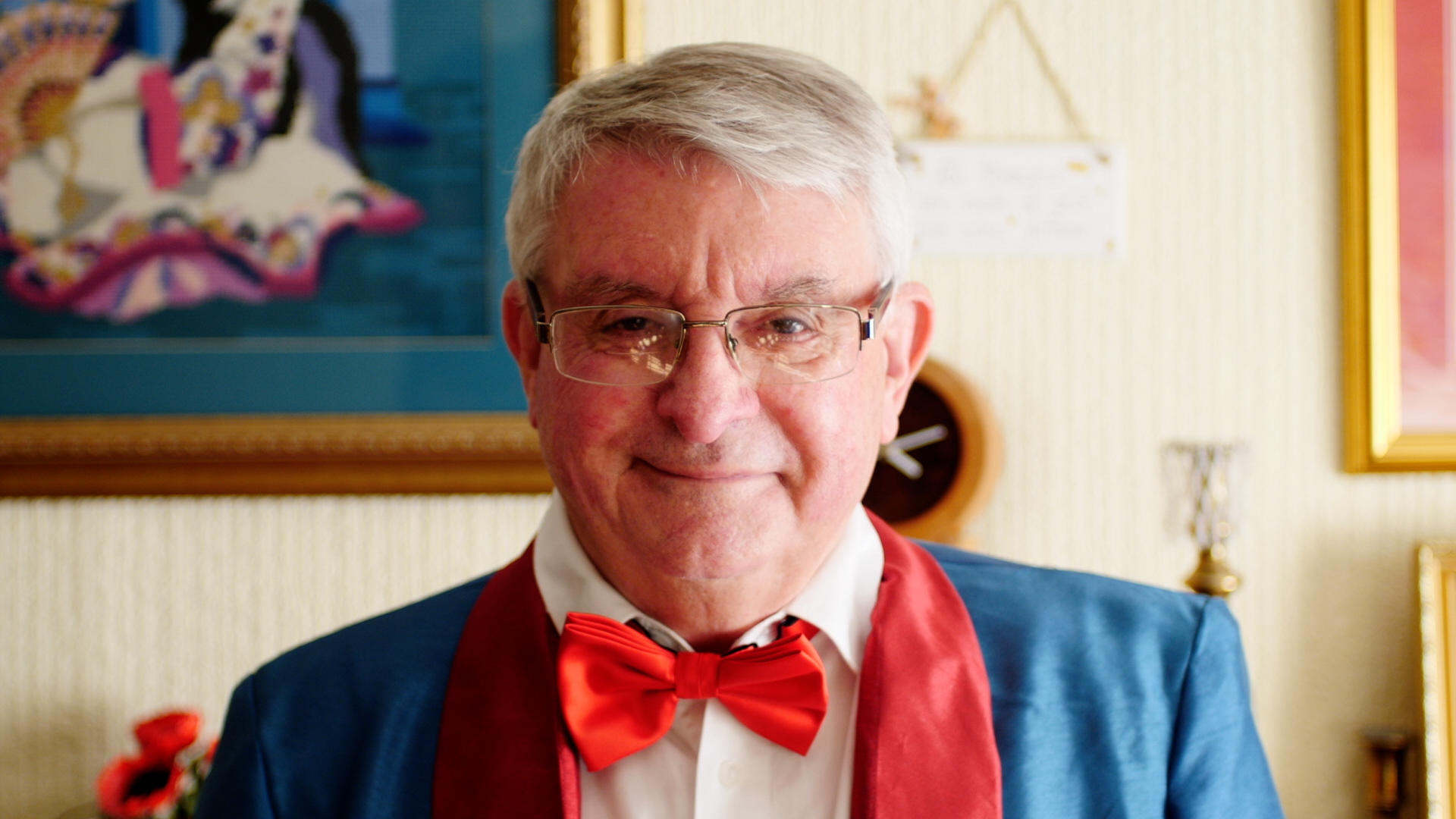
John Gates
John Gates, 82, lives in Maesteg and comes from a family of miners. He started working at Coegnant Colliery at just 15 and worked his…
Read John's Story
John Gates
John Gates, 82, lives in Maesteg and comes from a family of miners. He started working at Coegnant Colliery at just 15 and worked his way up from trainee colliery to fitter, to first aider and ‘rescue man’.
John said: “I left school with no qualifications, and I could barely read and write. I wanted to prove to myself and others that I could make something of my life.
“I worked underground for 19 years but decided to apply for a position at a training centre after my wife became concerned about the dangers of the job. It wasn’t until I moved to the training centre as a first-aid instructor that things really started to change for me.
“I studied a basic skills course for two years and realised that I could do anything I put my mind to. I went on to get three O levels at Bridgend College and a qualification in Computing which allowed me to keep working for another five years. I stayed on as a training manager for other collieries when the training centre closed.”
During his time at the training branch, John studied for a degree in Humanities at the Open University. He also established himself as a distinguished embroiderer and travelled the world to teach and inspire others.
He continued: “Growing up, I was surrounded by my mother and neighbours who sewed and knitted. Throughout the strikes in the 1970s, I was bored stiff and short of money, so I decided to give embroidery a go.
“I started completing kits and soon realised I could improve on the designs. As I grew in confidence, I started to create my own. I went on a gold thread course at Longleat House and did a residential course on Japanese silk embroidery. I even embroidered my two daughter’s wedding dresses and later my grandchildren’s christening gowns.”
John embarked on a two-year PGCE teacher training course and worked in special needs education. He completed his PGCE in 1998, the same year he won his Adult Learner of the Year award.
“During Adult Learners’ Week in 2000, I was asked to give a speech to welcome international visitors to the Millennium Dome in London. I ended up chatting to a gentleman who turned out to be a Minister for Education in Australia and he invited me to Australia to talk about my experience of redundancy in light of the pits and steel mills closing over there.”
Word spread, and since then, John has been invited to speak at conferences in Norway to Brazil’s CONFINTEA VI. He has spoken twice in the Houses of Parliament, as well as several times in Scottish Parliament and the Senedd as a global learning ambassador.
“I take a lot of pleasure from talking to and inspiring others. The most important thing about my story is how much I’ve enjoyed learning. Education is an adventure; when you start down that path you never know where it’ll take you,” said John.
“It’s taken me around the world and to places that I could have never afforded to go to, but the greatest benefit of all is confidence. Doors open and shut, but when a door opens, I have the confidence to walk through it.”
In more recent years, John has taken up the position of Chairman of a Men’s Shed, a charity aiming to tackle physical and mental health issues in men.
John said: “Men’s Shed was originally started in Australia to tackle the number of suicides in the outback. Noticing a similar spike in Bridgend, we decided to turn what had been a veteran’s club into a Men’s Shed and meet every Thursday for a cup of tea, lunch, and to chat about various projects and issues. It’s also an opportunity for men to develop their skills and to feel a part of the community.”
“Since its introduction, we have started to work with Parc Prison. There’s now a Men’s Shed in the prison itself that’s been accepted under the same umbrella. I am a regular visitor and enjoy the sessions.”
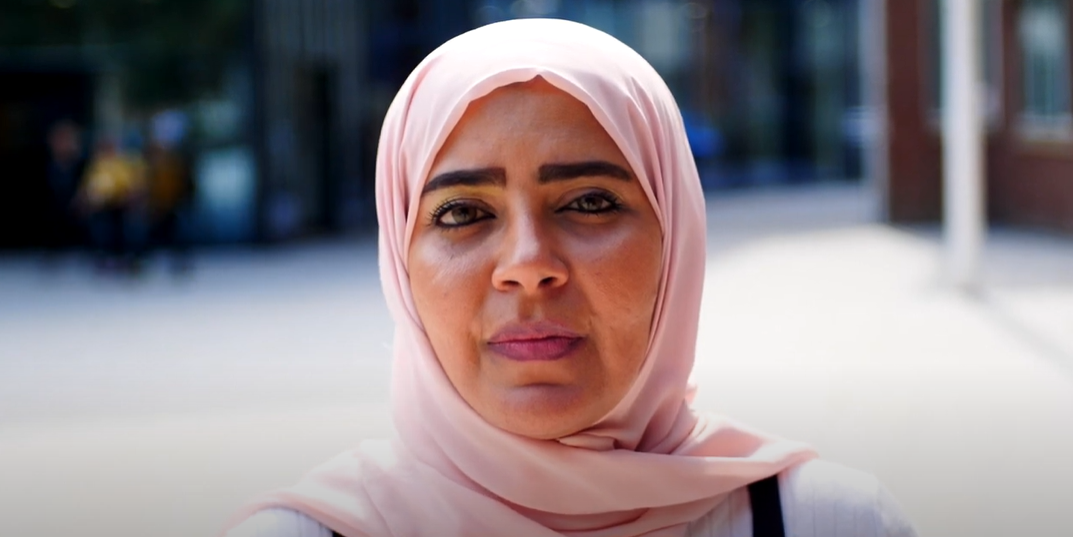
Fatma Al Nahdy
When Fatma Al Nahdy made the journey to the UK from Yemen in 2015, she didn’t speak any English and due to the ongoing wars…
Read Fatma's Story
Fatma Al Nahdy
When Fatma Al Nahdy made the journey to the UK from Yemen in 2015, she didn’t speak any English and due to the ongoing wars and turbulent situation in Yemen she had never attended school. Fatma could speak two languages fluently but didn’t know how to read or write.
Her son was born not long after she arrived, and she was determined to build a better life for him. So, when she was offered the chance to enroll on an English as a Second Language (ESOL) course at Coleg Cambria, she was nervous but excited to take on a new challenge. Just five years later, Fatma has completed ESOL as well as a Level 2 Diploma in Skills for Further Study and a Level 3 Access to Higher Education course. She passed her GCSE maths and English and has continued to broaden her knowledge by enrolling on ECDL, beginner’s Welsh and interpretation courses. Fatma’s goal has always been to become a nurse. She was recently accepted onto a nursing degree at Bangor University
For Fatma, learning English was an essential part of getting settled and starting her new life in Wales, she said: “I was nervous for the first class. I knew I would be meeting lots of new people, and I was very shy at first. But it was a lovely class, my tutors helped me to see the fun in learning and after a couple of months I started to feel more comfortable and more confident. Learning English meant I was able to get out and build links with the community.”
As well as the challenge of learning new things, Fatma is motivated by her desire for her son to have a better life. “Now I can speak, read, and write and understand English very well. I can read letters independently, go to the GP without a translator and support my son with his schoolwork.”
She continued: “My son is my motivation and inspiration. Learning during the pandemic was challenging because I was also home schooling and caring for him. Remote learning is not my preferred way of learning, but I am doing okay. I’ve always wanted to be a nurse, all the courses I’ve taken up to this point are to help me reach that goal. It hasn’t been easy, but now I’m closer than ever before to achieving my dream. I can’t wait to start my nursing degree next year, I am very grateful to be where I am, and I’d like to thank my tutors for helping me get there. They told me I was intelligent; nobody had ever told me that in my entire life. They motivated me to continue on my journey to nursing.
When I arrived in Wales, I didn’t know about any of the help that was available for me. I stayed in touch with the women who helped me and they’re like family now, my son has two ‘forever grandmas. My advice to anyone else thinking of taking up a course as an adult is to manage your time and focus on your goals – education is the key to life.”

John Spence
John began his learning journey with the Open University in 2010, graduating seven years later with a BSc (Hons) in Health Sciences, an achievement he…
Read John's Story
John Spence
John began his learning journey with the Open University in 2010, graduating seven years later with a BSc (Hons) in Health Sciences, an achievement he describes as “the most extraordinary of my life.”
John had struggled to learn at school, he had severe dyslexia and ADHD and had been told that “he would amount to nothing and did not deserve to be taught with others”. He says, “I was constantly made to feel and look stupid. Mocked by my teachers and belittled in front of other children. I was made to stand on a chair and asked to read in front of the class. They made an example of me, not realising I desperately needed help. My confidence was crushed, and I developed a stutter.”
Joining the army after leaving school, John saw active service as an Army Commando in Iraq and Afghanistan. Pushed to his physical limits he had a successful military life, but he continued to struggle with the personal demons seeded in his childhood.
He had never told anyone that he couldn’t read or write. It was only when he left the Army in 2000 and was working as an Ocean Paramedic, that his secret was discovered. “I used to memorise everything I learned by heart. The military is very physical, so it was easy to hide. But I always knew I’d be terrible in an exam.” His instructor noticed something was wrong and told him he was bright enough to progress in his dream career in medicine – and encouraged him, aged 34, to rejoin education.
John made nervous enquiries with the Open University. Assessments for dyslexia were made and with the support of tutors he progressed well. He was then diagnosed with a visual disorder associated with dyslexia. Despite needing to take longer to read through text books and complete assignments, John kept going, investing time and effort in mastering assistive technology. Working off shore brought additional challenges at exam time but these were overcome by recruiting the Ship’s Captain to act as an invigilator!
Graduating was a hugely emotional day. “There are no words to describe the dedication, patience and encouragement I received from my tutors. I started with them as a broken soldier, but now after a long journey I have progressed and I’m running my own teaching medical company.”
John is now a senior medical officer, travelling the world, responsible for the health of a crew of 150 and running his own medical business, PATRONAS Rescue International. His business is based on the principle of supporting others, teaching pre-hospital emergency care to teams of medics and supporting medical evacuations abroad and in the UK. He says, “If only my teachers had believed in me and not dismissed me as a ‘naughty’ child. I never imagined life could be like this. I was failed by education the first time, but I’m so glad I was given a second chance.”
Following his graduation John has become an Open University Ambassador, raising over £40,000 which has been used to establish a Disabled Veterans Scholarship Fund.
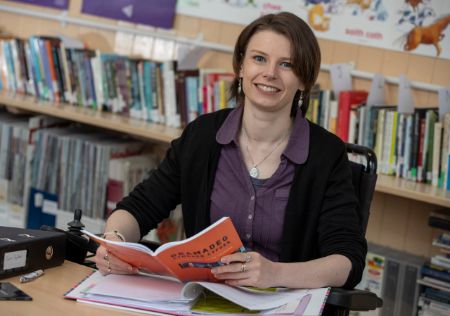
Rhiannon Norfolk
Having the opportunity to learn Welsh again was a key factor in Rhiannon Norfolk’s decision to move back to Wales. She inherited her love of…
Read Rhiannon's Story
Rhiannon Norfolk
Having the opportunity to learn Welsh again was a key factor in Rhiannon Norfolk’s decision to move back to Wales. She inherited her love of ‘Welshness’ from her mum and dad, who are originally from South Wales, and used to take her on holidays very summer to Gwynedd.
These family holidays inspired her to study at Bangor University where she planned to become proficient in the language, but her busy university schedule meant she had to drop her Welsh lessons. “I got on with life, as you do, but Wales has always felt like home and I had this yearning for the language.”
It wasn’t until she was living in Wiltshire years later that a chance encounter would see Rhiannon return to Welsh. “I saw a poster for a folk band called Calan, who were playing at the town hall in Chippenham,” she said. “I went along on my own and loved it. I felt a huge connection to the beautiful sounds of the Welsh language with the moving music, and it brought back some of what I had learned.”
When she saw a job advertised in her field of health service evaluation, she applied, got the job and moved to Wales. A year later, she has almost completed a fast-track foundation-level Welsh course at Penarth Learning Community.
“I felt really nervous going along but I was assured that I could build on the language skills I already had, despite them being rusty,” she said. “I worried I’d be so far behind everyone else with my very basic Welsh and that I hadn’t learned for 13 years, but it was brilliant. Everyone was so welcoming and it’s amazing how much you remember.”
Rhiannon attends the class for two hours every week alongside Saturday schools. She joins a reading group at Palmerston Adult Community Learning Centre in Barry and has attended a Welsh residential weekend with her mum, Gill, who is also learning at classes near her home in Monmouth. After receiving outstanding results for her entry exam, Rhiannon is now getting ready to sit her foundation assessment. “Learning Welsh has been a complete joy for me, I finally feel like I’m home.”
Rhiannon suffers with depression, anxiety and Complex Regional Pain Syndrome, which requires the use of walking sticks or a wheelchair and causes her constant pain and fatigue.
She said: “Coming to Welsh classes has made a great difference to my mental health and I take it at my own pace, taking a break in class if I need to. Learning gives me structure and a place to make friends. It’s helped me to keep my brain active and given me a sense of purpose and achievement. Giving up on Welsh was always a regret and I wanted to sort that out, and I feel so fulfilled now that I have.”
Suzanne Condon nominated Rhiannon, she says “It is clear that other learners in class love to practice with her, she’s brilliant at encouraging them to say as much as they can. She’s a learner on a mission and she inspires others.”
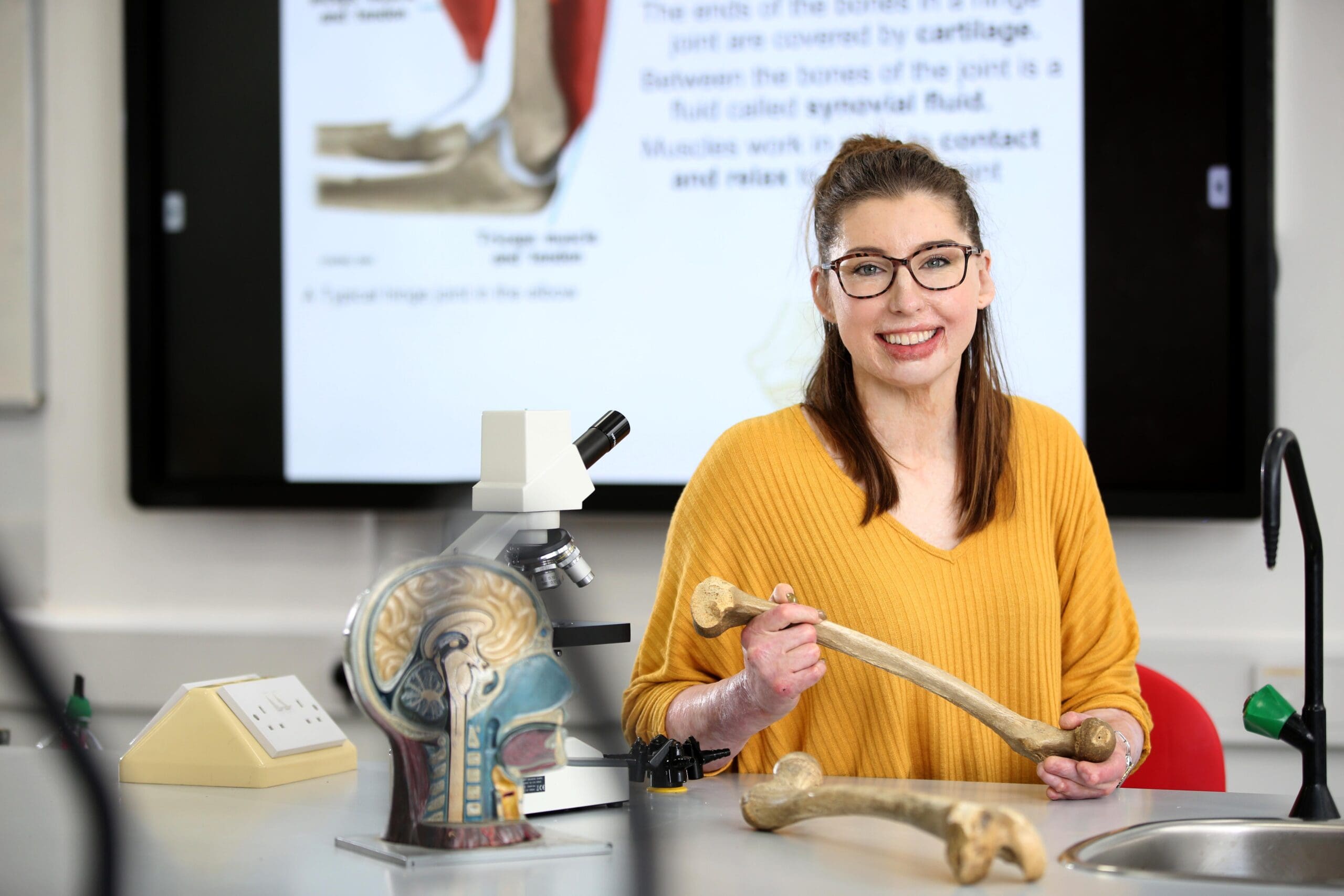
Catrin Pugh
Catrin’s life changed forever in 2013 when she suffered third degree burns to 96% of her body in a coach crash in France, she was…
Read Catrin's Story
Catrin Pugh
Catrin’s life changed forever in 2013 when she suffered third degree burns to 96% of her body in a coach crash in France, she was 19.
There wasn’t much hope of her surviving and she went into a coma for three months. She says, “I battled on, but I doubted whether I had a future. When I woke up from the coma, I’d had numerous surgeries and couldn’t move”.
Catrin was left with physical and mental scars, her central vision has disappeared, her left fingertips were amputated, and she struggled with post-traumatic stress disorder and flashbacks of being alight. She says, “Everyone’s lives were continuing while mine was on pause. It makes you question your worth, my self-confidence was shattered”.
Having spent the next four years in physical therapy learning how to walk, speak and eat again, Catrin said “I began to see that my physical disabilities and mental health issues were less of a barrier and more of a driving force to prove that anything could be achieved if you set your mind to it.”
Although the world felt like a scary place, Catrin pushed through these challenges and took her first step when she started working as a peer supporter with charities such as The Katie Piper Foundation and Changing Faces, giving motivational talks about surviving life-changing experiences. She says, “What I really wanted was to study again and work my way towards a meaningful career where I could make a difference.”
Catrin was inspired by the role of the Physiotherapist in her own recovery, and in 2017 she embarked on a journey to becoming a physio. She says, “Going back to education was terrifying. I had completed 15 years of education in the fortunate position of having no additional needs, now I had multiple.”
To pursue a degree in Physiotherapy, Catrin needed to gain a Level 3 science-based qualification. She enrolled on Agored Cymru’s Access to Higher Education course to study Biosciences at Coleg Cambria. She says, “After building the courage to show up, every day got easier. I was still intelligent, capable and adjustments made everything achievable.”
Excelling in her course, Catrin has received offers from University and will take up a place in September 2018. Jackie Grieves of Coleg Cambria says, “Everyone here has been dazzled and inspired by Catrin’s positive attitude and determination to achieve her goals.
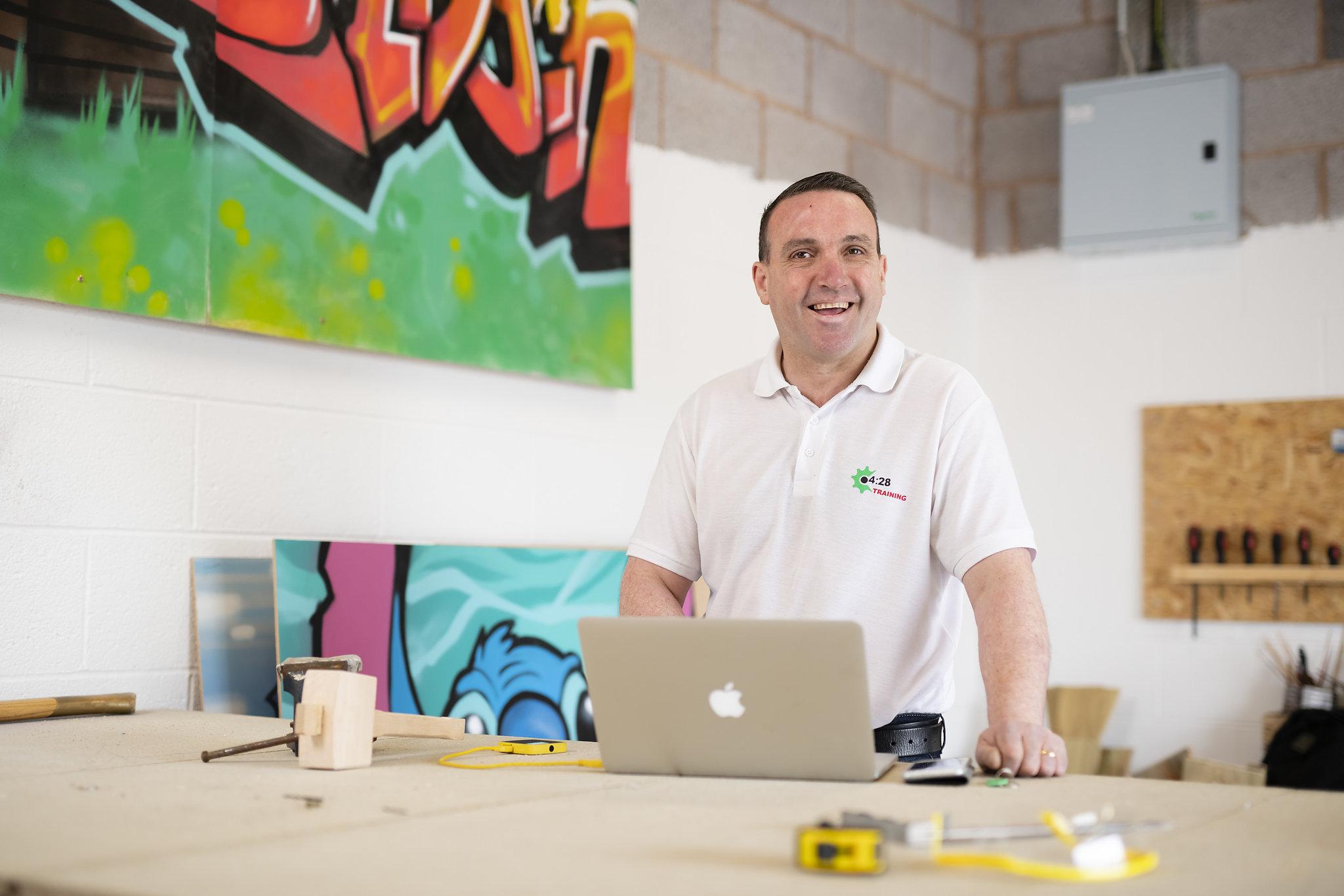
Scott Jenkinson
Ten years ago, Scott Jenkinson was struggling with substance misuse and was homeless. But thanks to adult learning, he has turned his life around. He…
Read Scott's Story
Scott Jenkinson
Ten years ago, Scott Jenkinson was struggling with substance misuse and was homeless. But thanks to adult learning, he has turned his life around. He is now a teacher and is happily married with a baby girl.
Back in 2005, adult education was the last thing on Scott’s mind but when staff at a hostel where he was staying encouraged him to apply for a course, he agreed to go as he needed somewhere to live. What he didn’t realise at the time was that this course would be the turning point he needed thanks to the guidance, motivation, and support he received there, he began to form a foundation for a new life and passed with a qualification.
In 2008, Scott went on to apply for a Learning Support and Social Care course and was inspired by his tutor to pursue the path that would lead him to becoming a teacher. He is now a part time trainer for Nacro working with young adults on the traineeship programme and is the founder of ‘4:28 training’ that provides training for adults who are walking a similar path that he once did.
Scott said, “My personal journey as an addict and an ex-offender has given me an insight into the path that led me to becoming a teacher and who I am today. I firmly believe that education changes lives and education can form the foundation for a new life, getting people out of the cycle of offending through opportunity, encouragement, and guidance.”
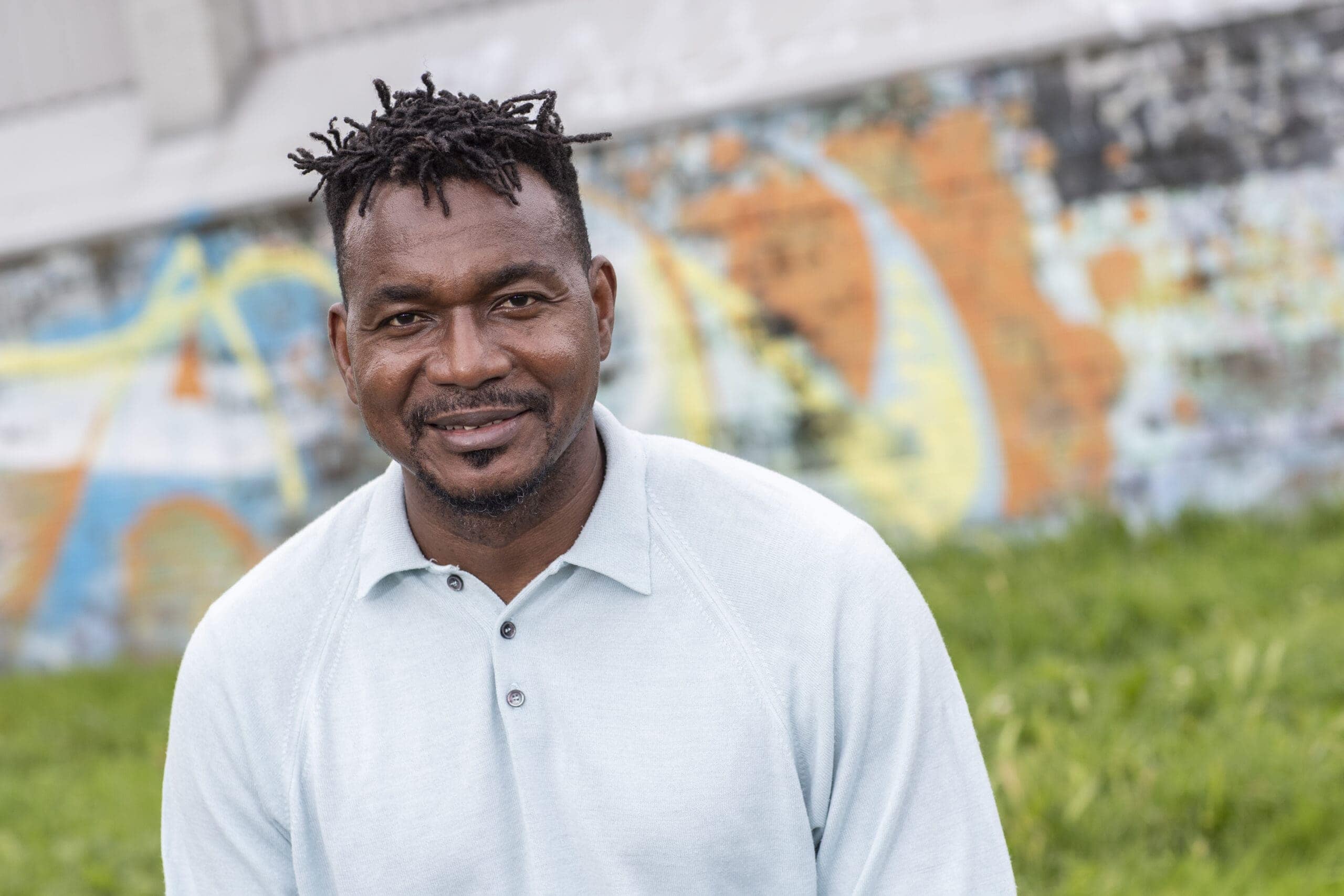
Joseff Oscar Gnagbo
Joseff Gnagbo was brought up on the Ivory Coast but due to unrest was forced to seek asylum in Wales. Then in just over a…
Read Joseff's Story
Joseff Oscar Gnagbo
Joseff Gnagbo was brought up on the Ivory Coast but due to unrest was forced to seek asylum in Wales. Then in just over a year, dedicated to immersing himself in the culture he became fluent in the language and is now teaching other asylum seekers basic Welsh.
He said: “My homeland was under siege, it was scary. There was a lot of fighting, so I was forced to flee to safety. I didn’t know anything about Cardiff let alone Wales, all I had heard was that it’s very green, less crowded and the people are really nice.
“I’ve lived all over the world and promised myself I would always learn the native language of the country I was in.
Joseff, who worked as a linguist in his West African home also speaks French, Swahili, Italian, Russian, German and Arabic. Attending the Oasis Centre in Cardiff the day after he arrived in Wales helped, he said, along with the ‘Say Something in Welsh’ app suggested by his tutor. He also followed courses with Learn Welsh Cardiff, run by Cardiff University on behalf of the National Centre for Learning Welsh.
Joseff now works as a carer, a translator and a teacher, and volunteers for Cymdeithas yr Iaith, the Welsh Language Society. He also gives half-hour Welsh language taster sessions at the Welsh Refugee Council – after learners have had an hour of English tuition.
He continued: “Some of my tutors were sceptical about adding Welsh to the English courses, they thought it may confuse people. But as so many signs are in Welsh and people speak the language, I think it’s important to know the basics, especially if you’re looking for work or have children attending bilingual schools.
“I want to continue developing my skills but also learn more Celtic languages like Gaelic and Cornish. I love walking through the centres where I volunteer and hearing asylum seekers and refugees saying diolch!”
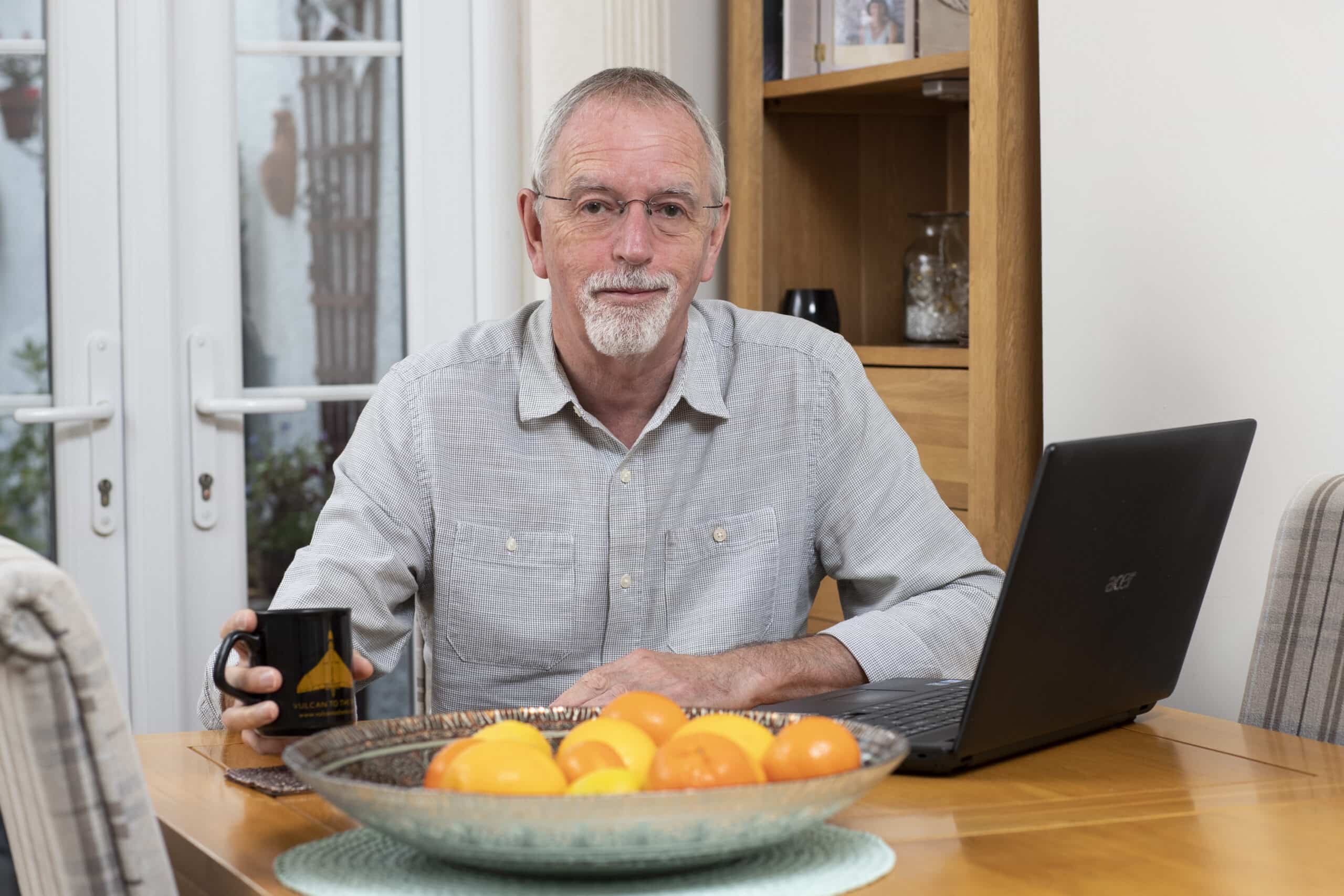
Ralph Handscomb
Retiree Ralph Handscomb, from Merthyr Tydfil has helped people search for jobs during lockdown, he’s a learner and a volunteer working with Merthyr Tydfil County…
Read Ralph's Story
Ralph Handscomb
Retiree Ralph Handscomb, from Merthyr Tydfil has helped people search for jobs during lockdown, he’s a learner and a volunteer working with Merthyr Tydfil County Borough Council Adult Community Learning at The College in Merthyr and the town’s JobCentre Plus.
Ralph said: “I have always been fascinated by computers. But with my seven O Level passes from the 70s, there were limited options in the industry, so my interest really began to grow when we got our first huge desktop PC at home in 1996. I took evening classes and was surprised how different it was to my school experience. People actually wanted to be there, and it just showed you can continue learning, in your own time and around your family commitments all while being treated as an adult.”
Ralph passed his first computer qualifications – CLAIT Level I and IBT Level II – in 1996 with and then went on to secure his European Computer Driving Licence in 2008.
He said: “I always brought my digital skills into every job I had, even as a bus driver I helped everyone in the office digitise and overhauled the route systems. Staying as up to date as possible with my training courses meant when I joined the Welsh Assembly Government in 2000 as the “new” Windows 95 system was introduced, I had already had five years’ worth of experience.
“My night classes and qualifications resulted in three promotions within the civil service but after 18 years I retired. I spent some time in the garden, but my wife wanted me to do something to fill my time – and to get me out from underneath her feet.”
Ralph returned to “school” completing the Award in Education and Training (Level III), which now enables him to share his skills and experience through his voluntary work. He said:
“I will never stop learning or teaching, it keeps my brain active and makes me feel good. I regularly practice my new methods on my family, I take pride in seeing my learners pass, gain confidence and the doors opening up for them personally and professionally. Once the learning flame ignites and burns the learners will achieve, and that pride is immeasurable.”
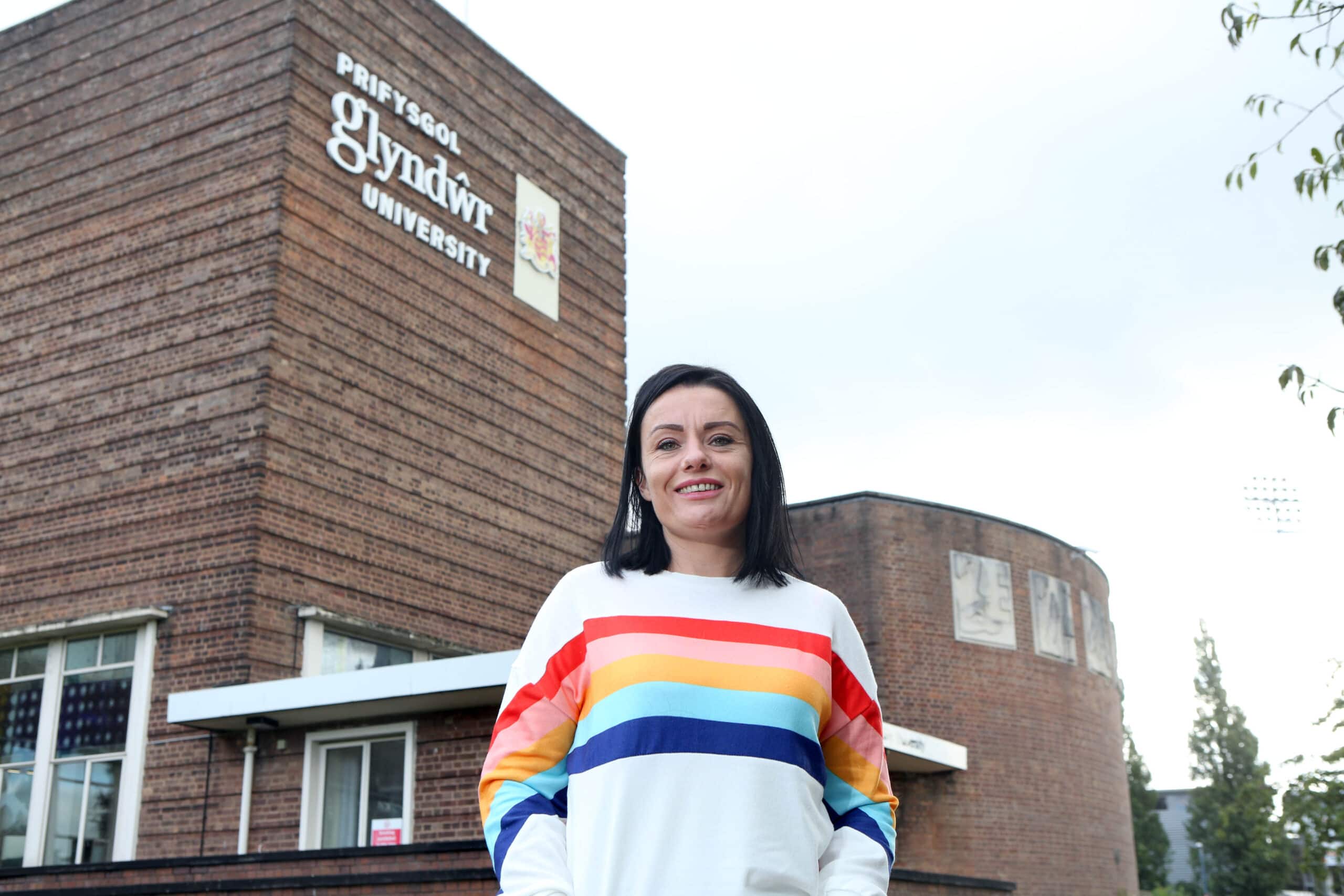
Emma Williams
Wrexham-born, Emma Williams had left home by the age of 14. Experiencing problems with her mental health and addiction, she found herself homeless in her…
Read Emma's Story
Emma Williams
Wrexham-born, Emma Williams had left home by the age of 14. Experiencing problems with her mental health and addiction, she found herself homeless in her teens. Emma gave birth to a daughter at 21 and, suffering with post-natal depression, her addiction got worse and she began her downward spiral. “Day and night, I didn’t know the difference,” she said. “I felt like I was destined for a life of hardship. Drugs and alcohol were a safety blanket.”
Eight years later, aged 29, she walked into a recovery centre in Colwyn Bay, called Touchstones 12. “There was a college next door to the facility. I started off small with a few employability courses to keep my mind busy. It was life-changing.”
While gaining help with her addiction, Emma applied for a job as a recovery support worker and spent the next two years as a case worker, helping others deal with their own problems with drugs. Being made redundant from the job she loved was a blow, but she used the opportunity to fuel her determination for learning and applied to university.
Returning to qualifications she had gained in her 20s and with the new courses she had completed, Emma was able to apply to start studying for an undergraduate degree in Forensic Science. The 39-year-old said: “Ten days later, I was sat in my first Quantum Chemistry lecture. I’ve suffered majorly with imposter syndrome, not many of the students look like me or have had similar backgrounds – but I am so determined.”
Over the next five years she completed her undergraduate degree in Forensic science, a PGCE, and is in the process of completing an MRes in Forensic Anthropology and Bioarchaeology with a focus on biological anthropology at Wrexham Glyndwr University. After qualifying as a teacher, she taught on the undergraduate Forensic Science degree and is now a science communicator for Techniquest in North Wales, working as a role model for females in STEM subjects. “Now I encourage girls to study science like me,” she said.
She said: “I was told I wouldn’t live past 30 if I continued to live my life like I did. Yet I know so many people who have been through worse. If I can inspire at least one person or show someone who is struggling, that you can change your life through education, then it’s all worth it.”
Admitting it hasn’t been easy, Emma, who discovered she had additional needs, encouraged other people to ask for help: “When you struggle to believe in yourself, the people around you make all the difference. The support I had not only from my loved ones but my tutors too, helped me find my passion and my voice. I want to prove to my daughter that she can do anything she puts her mind to – just like me.”
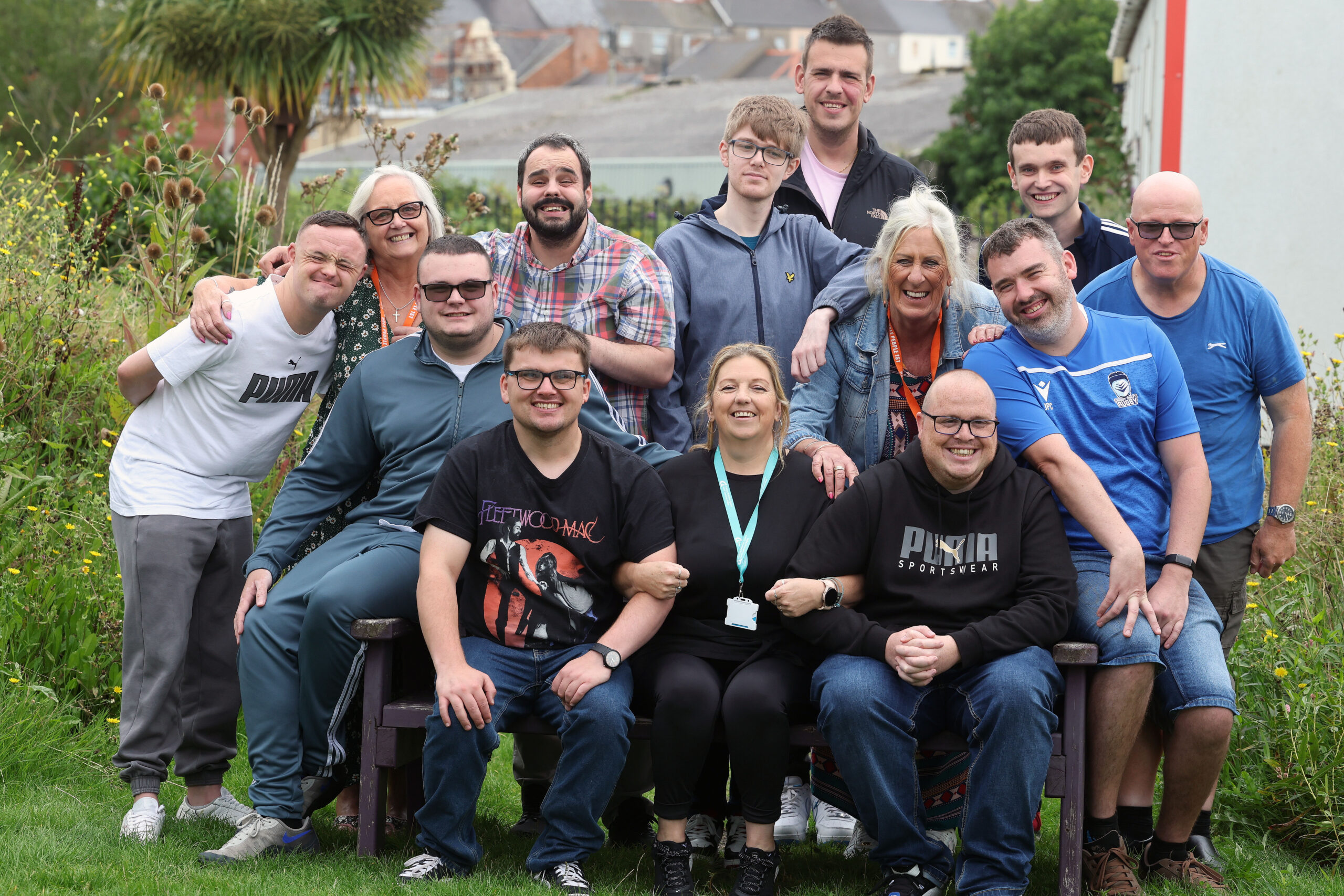
Vale People First Men’s Group
Formed in 2012, Vale People First Men’s Group offers men in the community a safe space to learn new life skills and connect with each…
Read Vale's Story
Vale People First Men’s Group
Formed in 2012, Vale People First Men’s Group offers men in the community a safe space to learn new life skills and connect with each other.
The sessions, which run weekly from a community centre in Barry, give members the opportunity to gain qualifications, make new friends, and discuss issues that are important to them.
Ages range from 18 to 60+, and some live with various conditions, including autism, cerebral palsy, schizophrenia, and depression. With the weekly four-hour session becoming so popular, a waiting list was started, and a second group formed to accommodate demand.
The group is run jointly by tutors, Liz Marriott and Joanne Price. Joanne explains: “We start each session with a quick check-in, talk about good news or any problems then move on to different subjects.”
Some of the topics covered include anger management and coping with emotions, budgeting, recycling, food preparation, digital support and other life skills such as time management.
Many group members have seen huge boosts to their confidence from attending the sessions, and some have gone on to start volunteer positions or have learnt to read and write. Sessions are not only used to discuss vocational topics, but the group also provides an environment for the development of social skills and friendships.
Joanne said: “A lot of the men suffer with loneliness, so coming to the sessions means they get out of the house and talk to people, it gives a sense of companionship and a safe space. We often have other organisations come in and discuss different topics such as men’s sexual health – help which they might not seek on their own. One of the main skills we teach is writing and one member recently learnt how to write a capital A, and his sister’s name is Ashleigh, it can be the smallest things that can make a big difference.”
Mark Tierney couldn’t read or write when he first joined but has since learnt and is now employed as the group’s health and wellbeing officer. He said: “I have been a part of Men’s group from the beginning, and I love it. I can read and write now, and I have a job with the group. You are never too old to learn and it’s better when you can have fun at the same time. I used to feel miserable, and I used to moan a lot but now I’m always happy.”
Moving forward, the group plans to carry on exploring new topics and encourages learners to suggest subjects they’d find useful. Time is also set aside for unaccredited courses, such as setting up a pretend shop to put the men’s money management, food preparation and social skills into practice.
Joanne says: “I absolutely love the group. We laugh until we cry during our sessions and it’s so nice to see first-hand how people’s skills can improve.”
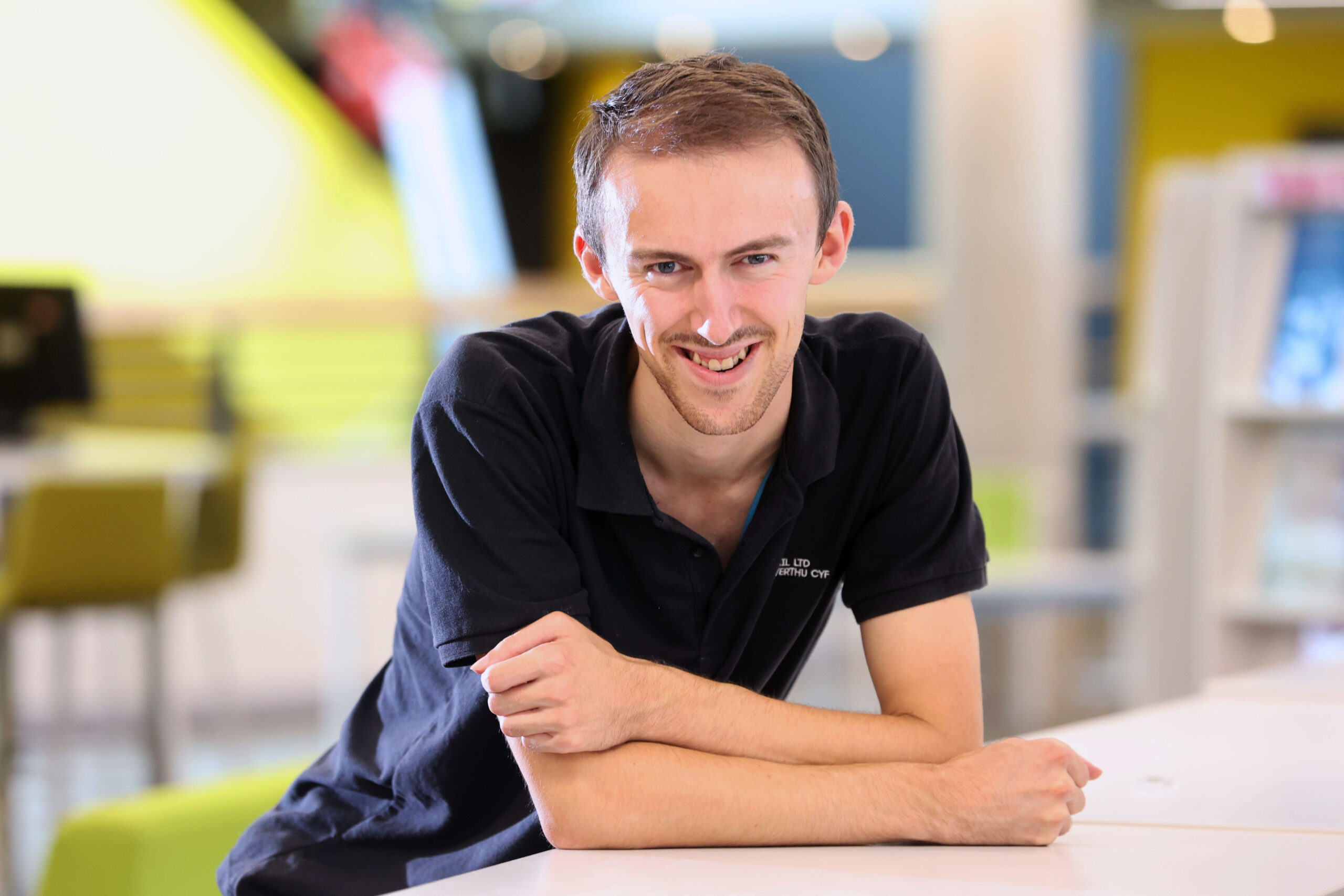
Ewan Heppenstall
Ewan Heppenstall enrolled at Cardiff and Vale College (CAVC) in 2018, initially studying an Entry Level 2 Work Skills Programme. The 23 year has mild…
Read Ewan's Story
Ewan Heppenstall
Ewan Heppenstall enrolled at Cardiff and Vale College (CAVC) in 2018, initially studying an Entry Level 2 Work Skills Programme.
The 23 year has mild autism and says, “I’ve never let my autism get in the way. But I didn’t feel confident at all growing up. I had never really thought about my future before, but I knew I had to start.”
Successfully completing the course, Ewan started the Entry Level 3 programme the following year. He completed a BTEC qualification which covered a range of areas including preparing and learning for a workplace, health and safety at work, working in a team, planning and running an enterprise activity, how to conduct yourself at work, producing a CV and applying for jobs.
Ewan secured a place on DFN Project Search – a supported internship programme between Cardiff and Vale College and Dow Silicones UK Limited in Barry. He felt apprehensive at first, but he soon started to grow in confidence:
“I had to do a video interview to apply, and I was one of just six people to get a place. I thought, “this could be my big shot.” It really opened my eyes. I learnt more about using lots of different computer programmes like Excel and Word.”
Having completed one internship at Dow remotely, he was excited to move on site once Covid restrictions eased: “It was a very interesting experience and a good insight into what working life is like. I was working with a team; people had my back and I had theirs. I really enjoyed finding out what it was I wanted to do. I knew I was good with people, and I was able to apply the skills and knowledge I had gained to a real working environment.”
CAVC Head of Preparation for Work, Life and Learning Wayne Carter said: “Ewan is a shining example of the journey that young people embark upon. From a shy and quiet individual with limited confidence and work skills, Ewan now believes in himself, we’ve stretched and challenged him and provided opportunities that he can thrive on, focusing on things he can do and not what he can’t do”.
Ewan is now employed full-time at CF10 Retail – a shop on the CAVC campus: “I am always eager to get stuck in and work hard. People see me as an asset, I really love working there.”
Ewan is an advocate for opportunities for disabled people to join the workplace. He adds:
“Disabled people should be included and given a chance to prove themselves. We should be included by more employers.”
Now, he also delivers motivational workshops to other learners who are at the start of their own journeys: “Just try your best and give it a go. Education and skills training can open doors and can give everyone a second chance.”
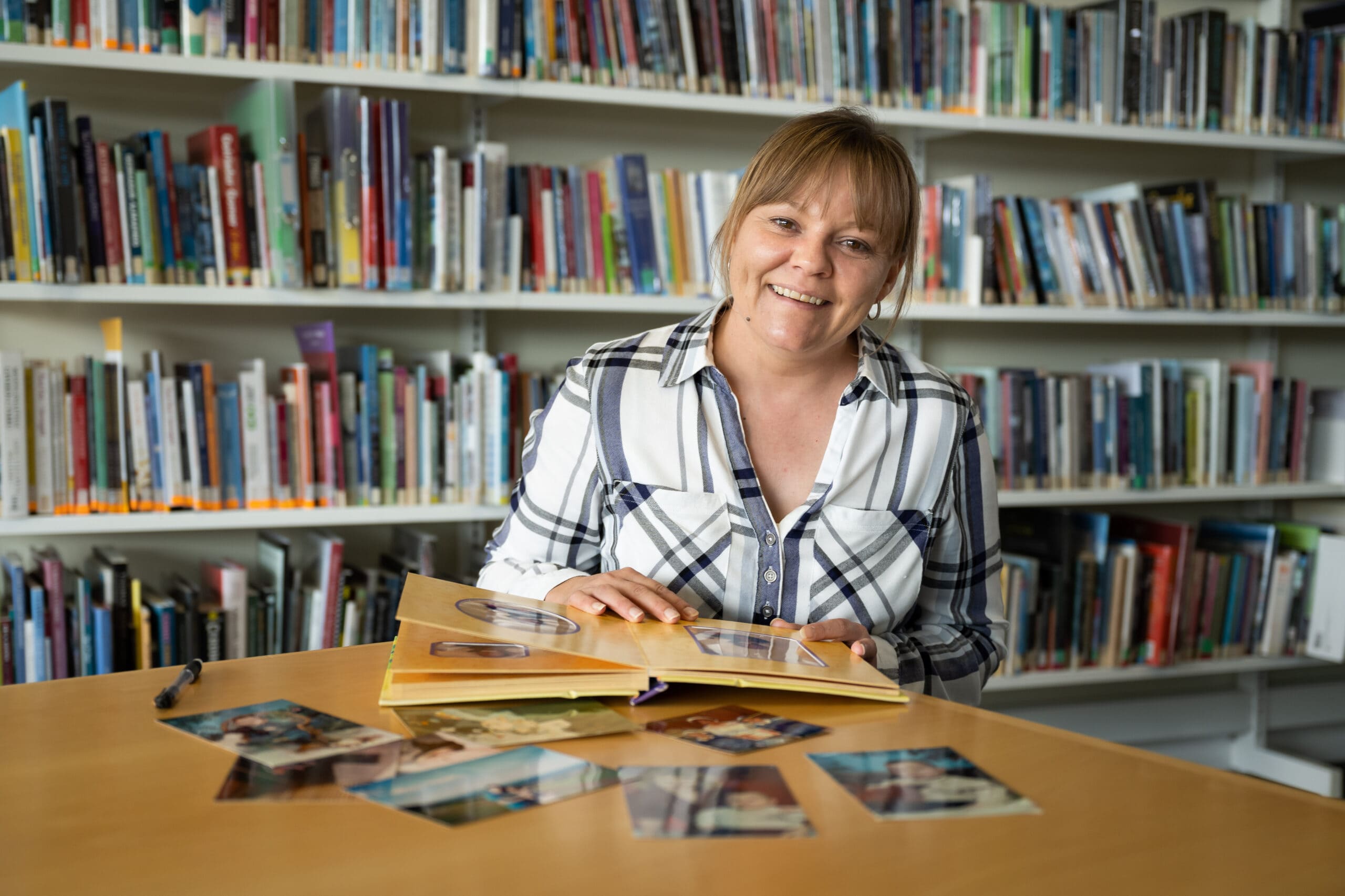
Clare Palmer
Clare Palmer left school at 14 with no qualifications. Clare was passionate about helping others and dreamed of a career where she could give something…
Read Clare's Story
Clare Palmer
Clare Palmer left school at 14 with no qualifications. Clare was passionate about helping others and dreamed of a career where she could give something back. But, by the age of 18, she was a mum with a baby son to care for.
She worked as a hairdresser for the next 14 years to support her young family. When she moved back to Wales with her son in 2013, she decided to use her passion for helping others to become a care assistant. After six years working in the care sector, Clare dreamed of becoming a social worker. Knowing she would need maths and English qualifications to get accepted onto a social work university course, she joined the Vale Learning Centre and went on to complete her Level 1 Application of Number and Level 2 in Communication.
Clare discovered she would still need to gain an additional maths qualification to get into her first-choice university. So, a year after securing her first qualifications, she returned to the Vale Learning Centre to begin studying her Level 2 Application of Number. This came as she was working in the hard-hit care sector during the pandemic.
“I left school with no qualifications at the age of 14 and took my own path. I had my son, Taylor, at 18 and adulthood smacked me in the face. I love helping people. Putting a smile on someone else’s face and making a difference in their life is a great feeling.
In 2019, after completing a Level 3 Diploma in Health and Social Care, Clare gained more self-belief about how far she could take her career. She decided she wanted to take her passion for care a step further and apply to university to become a social worker.
By the time the pandemic hit in March 2020, she had achieved Level 2 in Communication and Level 1 Application of Number. From the age of 14 to 41 I’d done no maths or English. I was apprehensive at first and, honestly, I was terrible at it. But I threw myself into it and I know after just a few weeks that I’d had made the right decision
“I did so well in the first couple of months that I went on to do the Level 2 in Communication. The course was only two days a week, which meant I could continue to work as a care assistant while I was learning.”
At one point I was working up to 60 hours a week, sometimes working seven days in a row. We were exhausted. On top of that, I was trying to balance my own learning with looking after my son and keeping our house in order. I’m still not sure how, but we got through it. Reflecting on her experience of adult learning, Clare said: “It’s been tough at times but I’m incredibly glad that I did it. My experience has been fantastic, I’d really recommend it. I’m closer now than ever before to achieving my dream of becoming a social worker.
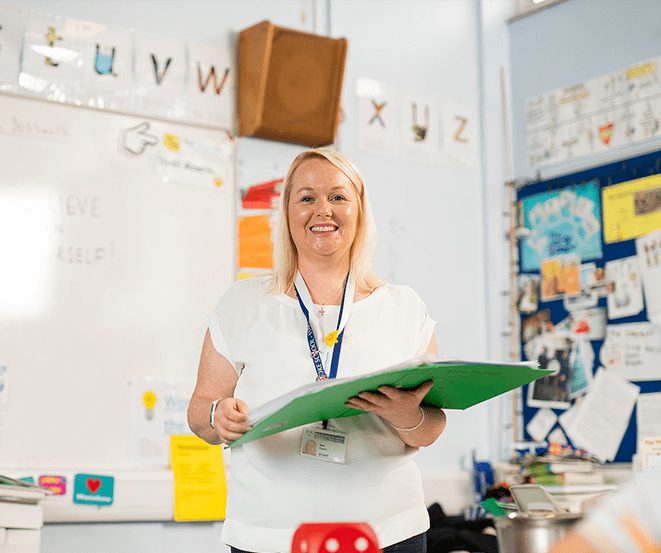
Rose Probert
Single mum Rose from Pembrokeshire left school without any grade C or above GCSEs but had always dreamt of becoming a Special Needs teacher. She…
Read Rose's Story
Rose Probert
Single mum Rose from Pembrokeshire left school without any grade C or above GCSEs but had always dreamt of becoming a Special Needs teacher. She grew up with her traveller family, helping to care for her severely disabled brother; and from the age of three she knew how to react to his frequent seizures.
Rose still cares for her brother and has brought up her 10-year-old daughter Olivia, without any outside help or support. Despite this, she jumped at the chance to restart her education after having numerous jobs as a cleaner.
In order to achieve her dream, Rose wanted to get her GCSE’s and successfully gained English and Maths while studying through Launch Learning at Monkton Priory Community Primary School.
Rose then went on to complete a Foundation Degree in Education and Social Inclusion, provided by University of Wales Trinity St David. Despite being 40 miles away, it didn’t stop Rose achieving her goals. The programme also allows students to complete a further year in order to gain a BA (hons) degree. In 2015, Rose qualified with a BA First Class honours; the highest achievable grade. She starts her post-graduate studies in Special Needs in September.
Rose is not only a role model for her daughter, but the traveller community. According to the UK 2011 Census, 60% of the 58,000 people who identified themselves as being Gypsy or Irish Travellers had no qualifications.
Rose said: “I never thought in my wildest dreams I’d be where I am today; I’m still in shock I’ve achieved so much. Being a part of the Gyspy/Traveller community, there is no pressure to do well at school. I hope I show that with hard work and determination, no matter what your background, you can follow your dreams.”

Tom Dyer
Tom Dyer turned the pandemic into an opportunity to try something new. “When Covid came along and I was made redundant, I decided to move…
Read Tom's Story
Tom Dyer
Tom Dyer turned the pandemic into an opportunity to try something new. “When Covid came along and I was made redundant, I decided to move back from Cardiff to Haverfordwest to help my sister home school my niece. I thought Covid would blow over quite quickly,” says Tom.
Tom’s sister was a keyworker, so he quickly took over the reins of the homeschooling. During online lessons, he was busy thinking what he could do next. He had worked at Tenovus as the lead for the ‘Activate Your Life’ programme, which uses the principles of Acceptance and Commitment Therapy to help anyone affected by cancer.
“My sister and I decided to release short videos on Facebook to help people cope in lockdown. I wanted to use the principles of Acceptance and Commitment Therapy to help people get through lockdown. It’s all about finding your values, accepting what you can’t change but committing to who you want to be now and in the future.”
From Monday to Thursday, a new video would drop at lunchtime with a singalong music item on a Friday evening and the duo soon attracted the attention of Pure West Radio. “We got in touch to tell them about our Facebook item, and they offered us a show. We both started presenting early breakfast which was brilliant fun.”
Tom has now been presenting a show for two years on a freelance basis. At the very beginning, the station asked him if he would consider learning Welsh as part of a fast-track programme with Dysgu Cymraeg Sir Benfro.
“This is what got me started learning Welsh but it’s something I’ve always wanted to do,” says Tom. “I’ve basically done four years’ worth of learning in two so it’s quite intense. Luckily, my girlfriend Helen is first language Welsh. It’s good to be able to have conversations in Welsh with someone outside of lessons.”
Tom has passed the first level ‘Mynediad’ and is currently awaiting his ‘Sylfaen’ level results before advancing to ‘Canolradd’ in September. He always tries to incorporate Welsh phrases and culture into his radio show: “I always try to weave little phrases into the show. We greet people in English and Welsh, and I do a 10-minute item called ‘Phrase of the Week’.
He has also been keeping a video diary so he can share his progress and encourage others to learn and is committed to – and enthusiastic about – his own learning. I am someone who grasps opportunities. In many ways, Covid created opportunities for me. I was lucky that I didn’t lose anyone, or that anyone close to me was very unwell, but I don’t think I’d be learning Welsh if I hadn’t been made redundant.”
Tomos Hopkins, Welsh tutor at Dysgu Cymraeg Sir Benfro, says: “Tom has an enthusiasm for the Welsh language which is incredibly infectious. And he’s now bringing it to a new audience with his radio show which is a massive benefit to the language.”
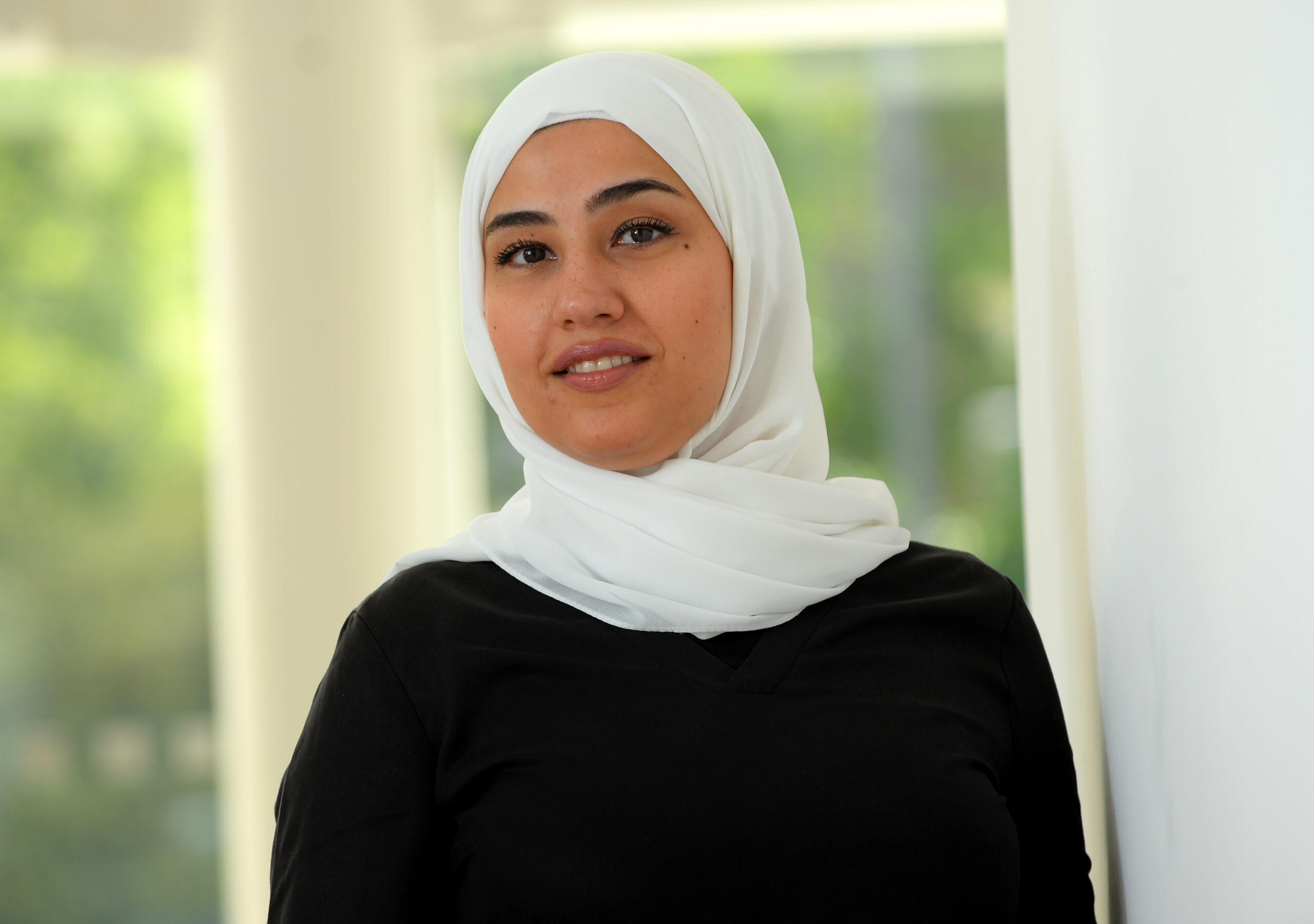
Zaina Aljumma
Zaina Aljumma arrived in Wales three years ago after fleeing civil war in Syria. In the short time since her arrival, she has not only…
Read Zaina's Story
Zaina Aljumma
Zaina Aljumma arrived in Wales three years ago after fleeing civil war in Syria. In the short time since her arrival, she has not only learned English but has also embarked on a master’s degree at the University of South Wales, completed two levels of British Sign Language, gained qualifications in public service and interpreting, and is learning Welsh.
She not only juggles her studies with bringing up her two young sons but also works full time and volunteers.
She had just started a master’s degree in Syria when the civil war forced her to flee:
“It was horrible. Where we lived was being bombed, there was no electricity, no water, no internet. I had to leave family behind.”
She spent time in Kuwait and studied intensive courses in education for people with learning difficulties. But she was unable to stay and on arrival to the UK, things were very different:
“The English we studied at school in Syria was very basic. When I first got here, I didn’t want to leave my room because I couldn’t communicate with anyone. I felt useless.”
She started volunteering, which helped build her confidence and started an IELTS course – International English Language Testing System. Now, just three years after arriving in the UK, she is due to complete a degree in Education with Additional Learning Needs.
“It has been a really, hard learning journey but I have been lucky. My friends put me in touch with a lovely Syrian lady who has helped look after my sons. I always tell her that I wouldn’t be able to go to university without her as I would never have been able to attend my evening lectures.”
Zaina studies alongside full-time employment. Working for the City of Sanctuary, she has also taken on a role with Addysg Oedoloion Cymru | Adult Learning Wales as a Curriculum Developer. She is also keen to use the skills to help those who are struggling to learn: “Sometimes, sanctuary seekers who speak English as a second language find it difficult to learn. That might be because of the asylum process – which can challenge mental health, but it might also be because there are undiscovered learning difficulties. That is something I am interested in researching.
Zaina volunteers for several charities including Red Cross, Voices Network, Oasis Cardiff, and the Welsh Refugee Council. “My sons often come with me when I volunteer. They are brilliant little activists.” Alongside all of this she’s managed some time to start learning Welsh: “I can now read and write some Welsh. I am Syrian but I feel Welsh as well so it’s important to learn the language of the nation I now belong to.”
Mike Chick, from the University of South Wales, nominated Zaina: “What she has achieved is nothing short of amazing. She exemplifies how a culture can be enriched by integration. She has shown strength and resilience to study, work and volunteer and of course to bring up her two young sons.”
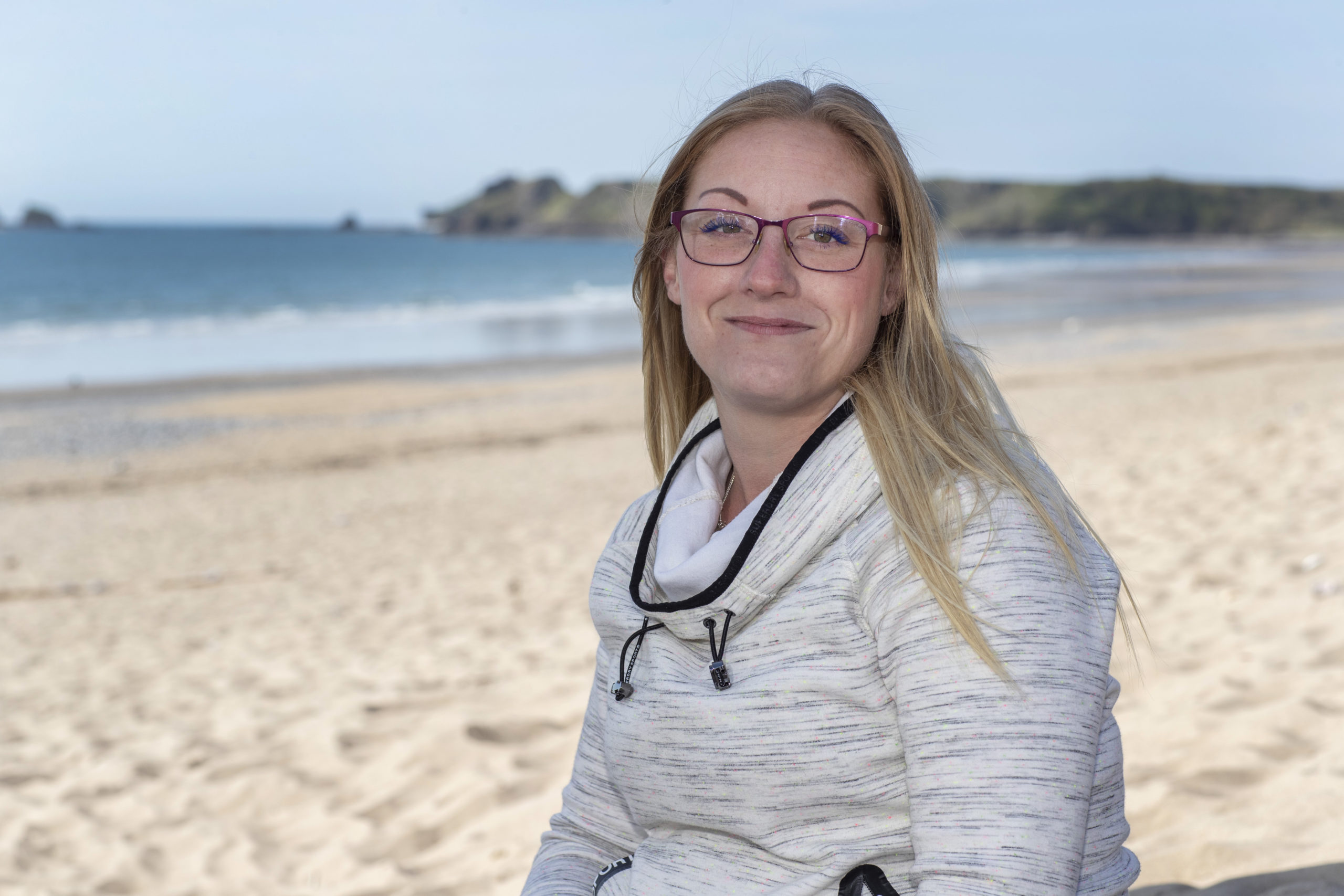
Natalie Lintern
Family learning has had a transformational impact on Natalie Lintern and her family. After several abusive relationships and battling drug addiction, she was bringing up…
Read Natalie's Story
Natalie Lintern
Family learning has had a transformational impact on Natalie Lintern and her family. After several abusive relationships and battling drug addiction, she was bringing up three young children on her own. She says, “life was miserable”. She became isolated, a lack of confidence, low self-esteem and anxiety made her feel unable to leave the house.
For six months, Natalie didn’t open the curtains and saw nobody outside of the home, she had started taking drugs at the age of 16 and later began taking heroin. “That six months of my life was when I was at my lowest. Two of the children were at school and nursery so it was just me and my baby at home. I always looked after my kids, they were always fed and bathed but it was an existence, not a life. There was no routine, day was night and night was day.”
Now, Natalie is moving forward and is on her way to becoming a drugs support worker after signing up to a family learning programme. “My eldest had anger issues and would come home from school and stay up all night on the computer,” she said. “My toddler couldn’t speak or make a sound. We didn’t read, there were no books, I had no quality time with my children. Life was chaos, it was no way to be living. I was terrified that the kids would be taken off me but I never let anyone into the house, so nobody knew how bad it was.”
It was at this point that she decided to get help. Her mum moved in and she connected with a Flying Start support worker, she began counselling and contacted her children’s school for the first time in months.
Teachers told Natalie about Springboard family learning and suggested she join in one of its regular sessions running through the school. Springboard is delivered across nine schools by Learning Pembrokeshire. Natalie signed up to weekly sessions, she said, “I was terrified, I’d never engaged with other parents or staff, but every time I went, I felt better. I remember the very first school trip, on a freezing beach, it was minus 4 degrees and I was in total panic. But there was something about the way the kids responded to it that made me keep going back.”
Over the next few weeks, Natalie and her family made kites on the beach, went rock pooling, and cooked on an open fire. “We did things we’d never done as a family before. We learnt to do orienteering, pond dipping and wildlife art, walk barefoot on the muddy paths and make bread. It wasn’t always easy, but it became a reason for me to leave the house. I made friends, my confidence grew, the kids loved every second, by summer, we were eating cake on the beach for my little girl’s birthday.”
Family learning gave Natalie the confidence to complete a 12-week Recovery Toolkit for survivors of domestic violence delivered by Team Around the Family. Since then, she’s attended other Springboard family courses and two additional courses – a MPower programme for women with low self-esteem and a Primary Years Parenting programme.
She gets her children to school each day – both eldest children’s attendance has reached 100%. “My son’s doing well, he comes home happy and can’t wait to do his homework. My daughter’s speech is brilliant – in fact, she doesn’t stop talking. My youngest loves reading, I’m reading now, too, I can’t give up. My children shouldn’t have been through what they have, but it’s up to me to keep us on this path.”
With the help of Communities for Work, Natalie, who is now 18 months drugs-free, is about to start training to become a qualified drug support worker. She said: “I want to help other people who may see themselves in my story. I want people going through problems to see how I turned things around. The support network I’ve had has been amazing and I’d urge people to ask for help. I’m excited about the future.”
“We get up, we go to school, I pick them up and we’re a happy, united family. We go to the park and feed the ducks. We do homework around the table. We read bedtime stories every night. Learning has changed my family’s life entirely. It has brought us back together and learning will keep us together.”

Marilyn Llewellyn
Lynnie Llewellyn attends two weekly classes to learn Welsh at Foundation Level 1 & 2 and regularly attends extra day schools and weekend courses to…
Read Marilyn's Story
Marilyn Llewellyn
Lynnie Llewellyn attends two weekly classes to learn Welsh at Foundation Level 1 & 2 and regularly attends extra day schools and weekend courses to develop her skills. She says, “Before I started learning Welsh I was Lynnie, now I’m Lynnie Welshwoman! Now I can speak, read and write in Welsh. Since learning, my world has been turned upside down.” She’s already succeeded in WJEC Access Exams, registering for the next, but her tutor says, “To be honest her progress is not the most important thing about Lynnie, it’s her enthusiasm towards the language and her willingness to use the language outside the classroom, with
her family, in the community and in the workplace”. Lynnie has attended residential courses, encouraging friends to come along with her to practice Welsh and she regularly attends social nights – but she shines in doing the small things, such as saying “Shwmae” and “Diolch” to shoppers in Caerphilly or taking shy learners from her class to the local coffee morning. Learning Welsh has given Lynnie new opportunities and she has taken advantage of them all. She has travelled throughout Wales, volunteered at the National Eisteddfod and she’s taken her grandchildren to a Welsh for the Family course at the Urdd residential centre in
Llangrannog – wanting them to share in the language and to have the opportunity to hear and start learning also. She says, “I started learning Welsh for my grandchildren and what a massive bonus to take them to Llangrannog, it’s their Christmas present, memories not toys!” Her enthusiasm for learning is infectious and Lynnie has taken an active role in supporting fellow learners by coordinating their engagement outside of classes through social media and volunteering. Her tutor says, “Lynnie is an excellent advocate for the Welsh language and shows how life-changing re-starting learning fairly late in life can be.”
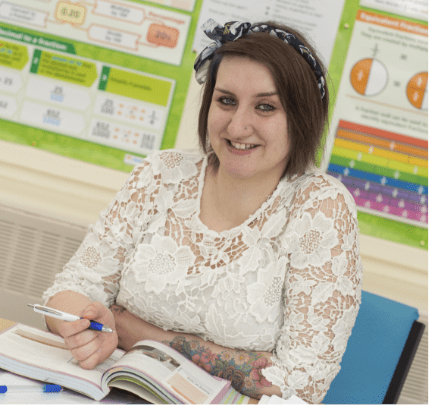
Emily Harding
Emily was driven to return to learning so that she could have the skills to support her little boy, who has additional learning needs. Emily…
Read Emily's Story
Emily Harding
Emily was driven to return to learning so that she could have the skills to support her little boy, who has additional learning needs. Emily is a single mum and has emerged from a turbulent childhood which left her withdrawn, battling with mental health issues and low self-esteem. At 15 she was diagnosed with anorexia and depression and she had been self-harming since the age of eleven.
She says, “I locked myself away for four years with awful anxiety and depression, leaving home would leave me with sweats and the shakes, then I realised the effect on my son, that’s when I knew I had to change.”
Emily went through a period of extreme weight gain and during this time she spent a long time locked in her home too scared to answer the door.
Seeing a teaching assistant work with her son inspired Emily to control her anxiety and lack of confidence and enrol on an Adult Community Learning Introduction to Childcare course. She has thrived in this learning environment and has progressed onto a level 2 programme as well as taking on other courses.
“My life changed for the better right from the start. For once I was looking forward to something that was for myself. Fridays were my day. After the course I would go running, not only did I gain confidence, education and freedom from my head – I finally started to lose weight.” Emily’s physical and mental health has improved, and she’s lost 5 stone since starting with Adult Community Learning and has recently started part-time work in a care home.
She’s used her learning from the childcare programme to develop her parenting skills and support her son’s development, as well as being better able to pursue professionals to secure the assessments he needs and to cope with the paperwork required to navigate the system.
“I’m now education hungry. I’ve completed three courses, currently enrolled on two and I’ve booked onto two more. I can finally see a future of worth. A future my son can be proud of.”
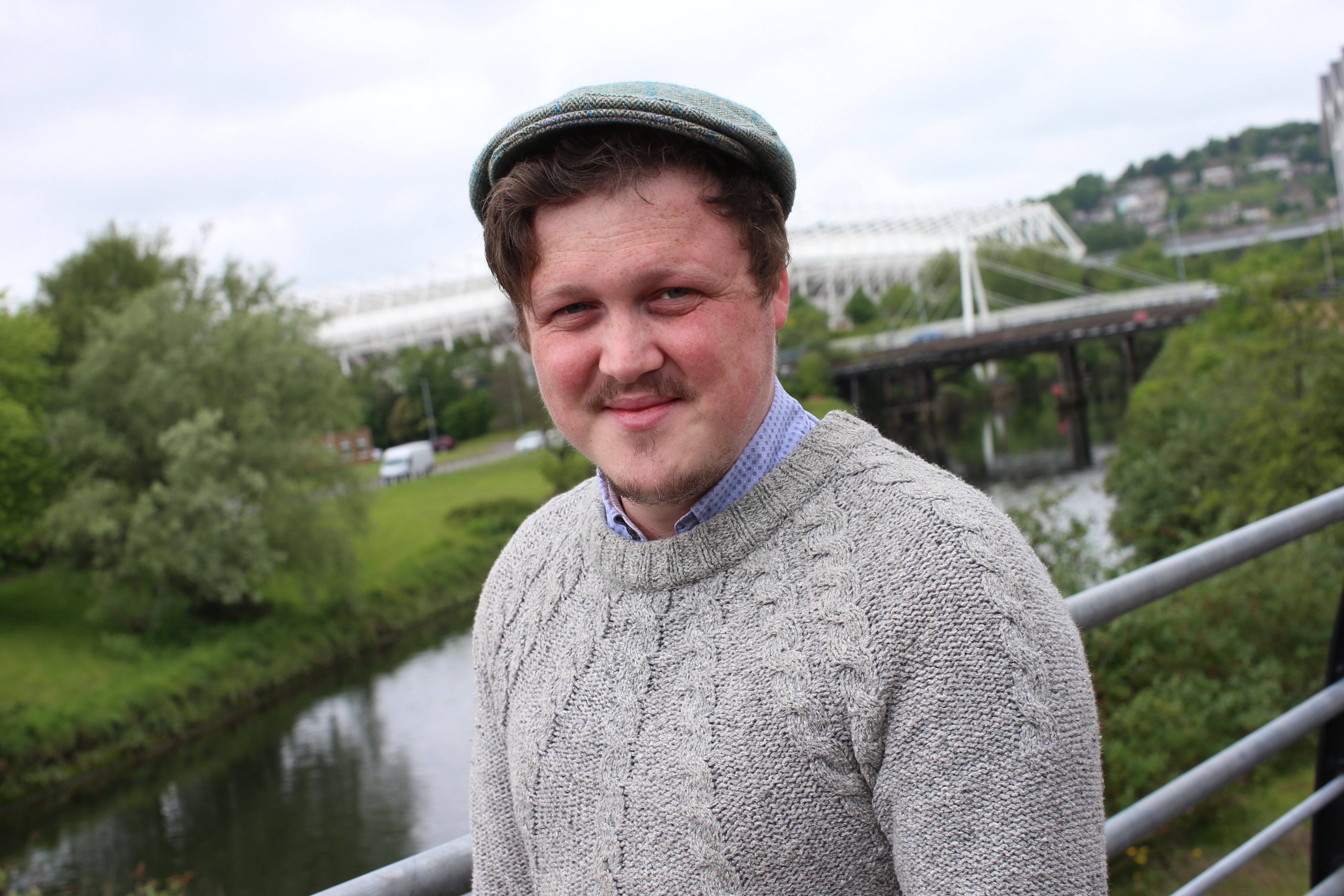
Sam Gardner
Sam always dreamed of becoming a primary school teacher so at the age of 18 he embarked on a BA Honours degree in Education Studies…
Read Sam's Story
Sam Gardner
Sam always dreamed of becoming a primary school teacher so at the age of 18 he embarked on a BA Honours degree in Education Studies at University Wales Trinity St David.
Coming from a care background with limited contact with his family, the isolation Sam felt during his studies soon became problematic. He spent his first Christmas alone in his student accommodation while others returned home to parents and loved ones. Over the next year or so that loneliness became a prominent feature of his life and although he did then manage to spend key holiday periods with previous foster parents and sometimes friends, it was a struggle for him. Sam’s grades were not the highest within his cohort but his ambition to succeed certainly was and he continued to make progress. As time went on it was clear that Sam was struggling with anxiety and depression and by the middle of what should have been his final year of studies he was no longer coping, the lack of a support structure outside university meant that he felt he was unable to continue.
Sam made the decision that he would take a break from his studies and return in the following academic year for a fresh start, to give him the best chance to improve his grades and attain his degree. He returned to his studies for his final year stronger, more confident and determined to succeed. He successfully completed his degree and graduated in the summer of 2015. He went on to secure a job as a teaching assistant and then applied to complete his PGCE qualification. Sam has showed determination and resilience despite his adverse life experiences and is now about to achieve his dream of becoming a fully qualified teacher.
“I believe that education is a tool that empowers, opens our minds and enables us to become socially mobile. I have never let me past define me but believe that they have only made me stronger and more determined to succeed.
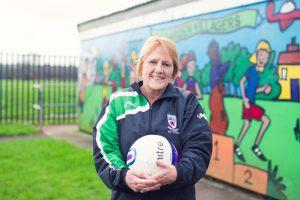
Lynda Sullivan
Lynda Sullivan was suffering from agoraphobia and depression in 2001 when a leaflet for adult learning came through her door. ‘For 3 years I barely…
Read Lynda's Story
Lynda Sullivan
Lynda Sullivan was suffering from agoraphobia and depression in 2001 when a leaflet for adult learning came through her door. ‘For 3 years I barely left the house,’ says Lynda, ‘I found it hard to be around people and crowded places caused me to have panic attacks. When I walked to Michaelston Adult Learning Centre. I was shaking so much I could barely talk, however the staff were very understanding about my illness. I then signed up for Computers for Beginners.’
It was at this time that Cardiff Council were going to build houses on the area known as the Rec. ‘I emailed people, got a petition going, wrote many letters using my computer to check for spelling mistakes,’ says Lynda. ‘This meant getting out of the house more, which wasn’t always easy. I held meetings, protested outside City Hall and after 2 long years we won our fight’. ‘We formed a group called Ely Garden Villagers and became active within the community. I now run 9 football teams starting from 8 -18 year olds’.
In 2010 Richard North was looking for a project as a secret millionaire in areas of poverty. He went undercover and was overwhelmed by the amount of work Lynda and her husband Peter were doing and provided the finance for football facilities at the Rec. He visited five months later and was delighted to see the improvement in the area and the greater number of young people taking part in sport. ‘Going to adult learning changed my life,’ says Lynda. ‘Everything I have achieved since then is down to doing all the courses. The day the booklet came through my door from the Adult Learning Centre my life changed.’
NEVER
STOP LEARNING
If you’re feeling inspired to change your story, our campaign is a great way to find out more about how you can learn something new and build your skills. Have a browse and find a range of free tutorials and courses such as arts and crafts, languages, digital skills, baking, maths, creative writing and many more!
WORKING WALES
Learn new skills and start your next chapter
Working Wales is for anyone over the age of 16 across Wales to access expert advice and guidance to help you overcome obstacles that you may be facing to get you into work.
So, whether you need help searching for jobs, writing a CV, preparing for an interview, finding work placement, learning new skills, understanding redundancy rights, childcare support, building self-confidence, or even where to turn next this is the right place to get the help you need.